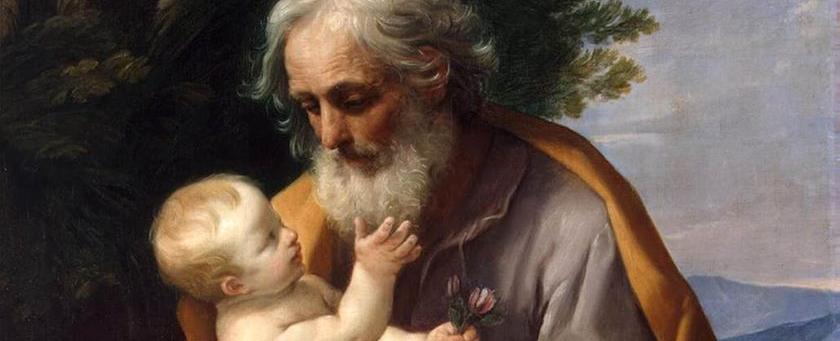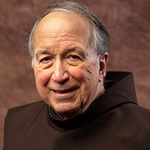St. Joseph

On March 20, the Church celebrates the solemnity of St. Joseph, transferred because his usual feast day (March 19) fell on Sunday this year. We’d just like to draw your attention to the important role that the Franciscan family played in popularizing devotion to Joseph. Here we Franciscans played a large part in the renewed focus on the humanity of Jesus that spread in the Middle Ages. As people followed Francis’s example at Greccio and contemplated the scene of Jesus’s humble birth, they began giving more attention to this silent figure who played such an important role in the life of Jesus.
Works such as the very popular Meditations on the Life of Christ, long attributed to St Bonaventure, but probably by the friar John “de Caulibus” of San Gimignano in the early 1300s, were very important in this process. Franciscan influence was especially important for extending devotion to St Joseph throughout the Church in the next century, especially through the great preachers Bernadine of Siena and Bernardine of Feltre. In 1480 a Franciscan Pope, Sixtus IV, permitted the Order to celebrate the feast of St. Joseph on March 19th and gradually this observance spread throughout the Church. Two Secular Franciscan Popes were also important in this process: in 1870 Pius IX declared St Joseph patron of the Universal Church and in 1962 John XXIII inserted his name into the Roman Canon (now Eucharistic Prayer I). In 2013, Pope Francis placed his name into the other three standard Eucharistic prayers, so today Catholics recall his name every time they celebrate the Eucharist.
“When our Lady was living with her husband Joseph, and Jesus was growing in his mother’s womb, Joseph saw that she was pregnant and grieved inwardly. He observed his wife again and again, in great grief and trouble, his face agitated. Then he turned his eyes away, with evil thought, suspecting this to have come about through adultery. Now you see how the Lord permits his own to be tormented by tribulations. . . Thus Joseph thought of leaving her secretly. . . But he was a just man, of great virtue. Joseph virtuously restrained himself from accusing her, patiently disregarding the injury and not seeking revenge; but overcome by pity, he wished to leave her secretly. . . But then the Lord sent his angel to Joseph in his sleep to tell him his wife had conceived by the Holy Spirit and he should stay with her confidently and happily. Thus his torment ceased and turned to great happiness. This would happen to us too, if we knew how to remain patient in the face of tribulation, for the Lord causes tranquility to come after the storm”. . . . Meditations on the Life of Christ, 21.
and grieved inwardly. He observed his wife again and again, in great grief and trouble, his face agitated. Then he turned his eyes away, with evil thought, suspecting this to have come about through adultery. Now you see how the Lord permits his own to be tormented by tribulations. . . Thus Joseph thought of leaving her secretly. . . But he was a just man, of great virtue. Joseph virtuously restrained himself from accusing her, patiently disregarding the injury and not seeking revenge; but overcome by pity, he wished to leave her secretly. . . But then the Lord sent his angel to Joseph in his sleep to tell him his wife had conceived by the Holy Spirit and he should stay with her confidently and happily. Thus his torment ceased and turned to great happiness. This would happen to us too, if we knew how to remain patient in the face of tribulation, for the Lord causes tranquility to come after the storm”. . . . Meditations on the Life of Christ, 21.
“How does Joseph respond to his calling to be the protector of Mary, Jesus and the Church? By being constantly attentive to God, open to the signs of God’s presence and receptive to God’s plans, and not simply to his own. […] Joseph is a ‘protector’ because he is able to hear God’s voice and be guided by his will; and for this reason he is all the more sensitive to the persons entrusted to his safekeeping. He can look at things realistically, he is in touch with his surroundings, he can make truly wise decisions. In him, dear friends, we learn how to respond to God’s call, readily and willingly, but we also see the core of the Christian vocation, which is Christ! Let us protect Christ in our lives, so that we can protect others, so that we can protect creation!” -Pope Francis, March 19, 2013.
Works such as the very popular Meditations on the Life of Christ, long attributed to St Bonaventure, but probably by the friar John “de Caulibus” of San Gimignano in the early 1300s, were very important in this process. Franciscan influence was especially important for extending devotion to St Joseph throughout the Church in the next century, especially through the great preachers Bernadine of Siena and Bernardine of Feltre. In 1480 a Franciscan Pope, Sixtus IV, permitted the Order to celebrate the feast of St. Joseph on March 19th and gradually this observance spread throughout the Church. Two Secular Franciscan Popes were also important in this process: in 1870 Pius IX declared St Joseph patron of the Universal Church and in 1962 John XXIII inserted his name into the Roman Canon (now Eucharistic Prayer I). In 2013, Pope Francis placed his name into the other three standard Eucharistic prayers, so today Catholics recall his name every time they celebrate the Eucharist.
“When our Lady was living with her husband Joseph, and Jesus was growing in his mother’s womb, Joseph saw that she was pregnant
 and grieved inwardly. He observed his wife again and again, in great grief and trouble, his face agitated. Then he turned his eyes away, with evil thought, suspecting this to have come about through adultery. Now you see how the Lord permits his own to be tormented by tribulations. . . Thus Joseph thought of leaving her secretly. . . But he was a just man, of great virtue. Joseph virtuously restrained himself from accusing her, patiently disregarding the injury and not seeking revenge; but overcome by pity, he wished to leave her secretly. . . But then the Lord sent his angel to Joseph in his sleep to tell him his wife had conceived by the Holy Spirit and he should stay with her confidently and happily. Thus his torment ceased and turned to great happiness. This would happen to us too, if we knew how to remain patient in the face of tribulation, for the Lord causes tranquility to come after the storm”. . . . Meditations on the Life of Christ, 21.
and grieved inwardly. He observed his wife again and again, in great grief and trouble, his face agitated. Then he turned his eyes away, with evil thought, suspecting this to have come about through adultery. Now you see how the Lord permits his own to be tormented by tribulations. . . Thus Joseph thought of leaving her secretly. . . But he was a just man, of great virtue. Joseph virtuously restrained himself from accusing her, patiently disregarding the injury and not seeking revenge; but overcome by pity, he wished to leave her secretly. . . But then the Lord sent his angel to Joseph in his sleep to tell him his wife had conceived by the Holy Spirit and he should stay with her confidently and happily. Thus his torment ceased and turned to great happiness. This would happen to us too, if we knew how to remain patient in the face of tribulation, for the Lord causes tranquility to come after the storm”. . . . Meditations on the Life of Christ, 21. “How does Joseph respond to his calling to be the protector of Mary, Jesus and the Church? By being constantly attentive to God, open to the signs of God’s presence and receptive to God’s plans, and not simply to his own. […] Joseph is a ‘protector’ because he is able to hear God’s voice and be guided by his will; and for this reason he is all the more sensitive to the persons entrusted to his safekeeping. He can look at things realistically, he is in touch with his surroundings, he can make truly wise decisions. In him, dear friends, we learn how to respond to God’s call, readily and willingly, but we also see the core of the Christian vocation, which is Christ! Let us protect Christ in our lives, so that we can protect others, so that we can protect creation!” -Pope Francis, March 19, 2013.
Dominic Monti, OFM
Professor of Franciscan Research in the Franciscan Institute of St. Bonaventure University
Dominic V. Monti, OFM, is a Franciscan Friar of Holy Name Province (USA) and currently professor of Franciscan Research in the Franciscan Institute of St. Bonaventure University. He devoted the greater part of his ministry to teaching the History of Christianity, in particular the history of the Franciscan movement. He has contributed two volumes to the Works of St. Bonaventure series and is author of Francis & His Brothers, a popular history of the Friars Minor.

